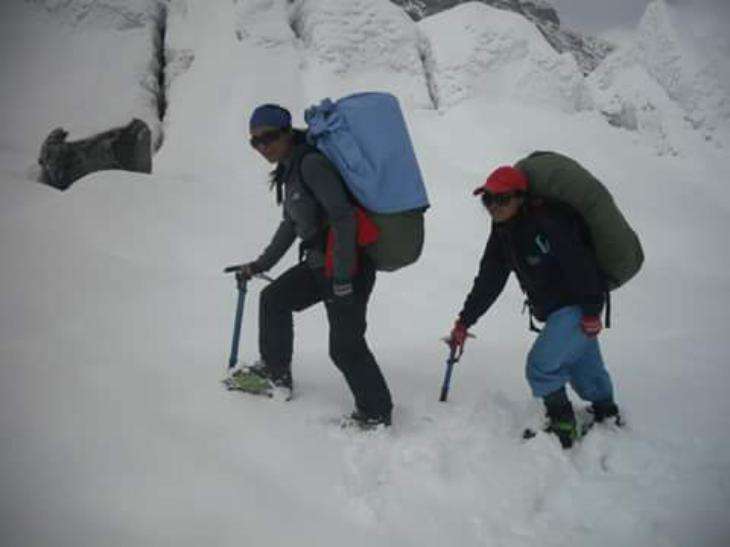
For what was once considered the ultimate test of character for a skilled mountaineer, the high and mighty Mount Everest is now plumbing the depths of being a just an item on an adventure seeker's bucket list.
A little over 4,400 climbers have reached the peak since Edmund Hillary and his Sherpa, Tenzing Norgay, made Everest's first official ascent back in 1953. And, by 2013, a staggering 6,871 summits were recorded by 4,042 climbers.
The rugged romance of pioneers like Andrew Irvine and George Mallory, the Britons who made the first attempt to climb the mountain in 1924, is far removed from the modern-day Everest experience with commercialisation stealing away more than just its glory.
For a two-month commitment and approximately Rs 40 lakh, people who are not qualified to be on the 29,029-foot mountain are brought in for commercial expeditions to climb it. Whether it's sushi or bars fully stocked with liquor, the climbers can now pay to enjoy a higher degree of luxury at 17,598 feet up the mountain.
Key to the narrative of the Everest ascent is optimism and putting huge effort in the face of danger. "Having people pay $65,000 and then be led up the mountain by a couple of experienced guides isn't really mountaineering at all," Hillary had said during an interview with BBC in 2003.
To understand the effects of commercialisation on the world's highest peak, Catch spoke exclusively to Indian mountaineer Bidyapati Ningthoujam who scaled Everest on 17 May, 2013:
What defines a true mountaineer

"Money plays an important role in scaling Everest, but it's not the only thing that one needs to reach the summit. The availability of funds and ever-increasing commercial expeditions allow amateurs to get the best-possible resources and equipment but ultimately it's the climbing ethics that will get you over the line," the ace climber from Manipur said.
"The challenges and difficulties of the unknown is what defines the experience of climbing the Everest. For me, it was either do or die. I would rather die than live with the feeling of failure. The priorities are no longer the same," she added.
A McDonald's experience

After waiting and preparing for her ultimate challenge, Bidya finally got the opportunity to scale the mountain in 2013. However, it was not quite the experience she'd expected.
"I was really excited for the climb, but the excitement slowly turned into a bit of disappointment after reaching the base camp. I didn't expect so many people to be there, honestly. Also, there were numerous helicopters being operated by commercial expeditions. Their movement scared me as the vibration could have easily triggered an avalanche."
"If that wasn't enough, the increase in the number of climbers that year forced us to wait for almost an hour at the Hillary Step. It didn't really feel like an Everest expedition, rather it reminded me of a crowded McDonald's. The isolation and wilderness seemed long gone," she added.
'Overworked' Sherpas under immense pressure

The Nepal government has grown dependent on the influx of money coming through commercial expeditions. The impoverished country resists placing a cap on the number of permits issued in a season, while sacrificing a certain level of competency in those who attempt the climb.
During her expedition in 2013, Bidya revealed that "an increase in the Everest ascents has taken a toll on the Sherpa community. A lot of Sherpas who are not even trained or experienced to help and guide the climbers travel with fake documents".
She recalled an incident where, one of the Sherpas assigned to her group claimed that he had undertaken several Everest ascents before, but in reality he was a newbie. "He almost got us lost after reaching Camp 2 site during the ascent. It could have proved disastrous if the group didn't have other Sherpas to guide them," she added.
First published: 10 June 2016, 3:54 IST





_in_action_250728_300x172.jpg)

![BJP's Kapil Mishra recreates Shankar Mahadevan’s ‘Breathless’ song to highlight Delhi pollution [WATCH] BJP's Kapil Mishra recreates Shankar Mahadevan’s ‘Breathless’ song to highlight Delhi pollution [WATCH]](https://images.catchnews.com/upload/2022/11/03/kapil-mishra_240884_300x172.png)

![Anupam Kher shares pictures of his toned body on 67th birthday [MUST SEE] Anupam Kher shares pictures of his toned body on 67th birthday [MUST SEE]](https://images.catchnews.com/upload/2022/03/07/Anupam_kher_231145_300x172.jpg)






